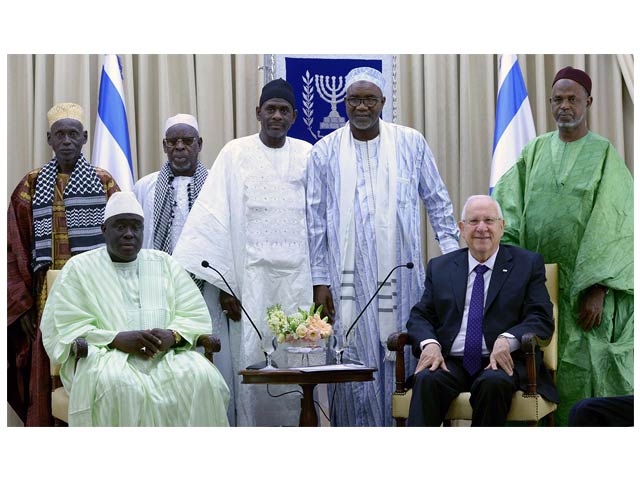(Communicated by the MFA Spokesperson's Bureau)
Imams and other Muslim religious leaders from a number of central African states arrived in Israel today for a four-day visit (13-17 March 2016). The visit was arranged by the Africa Division and the World Jewish and Interreligious Affairs Bureau of the Israel Foreign Ministry, in conjunction with the American Jewish Committee. The visit aims to familiarize the visitors with socio-political aspects of Israel; to generate an interreligious, intercultural dialogue; and to explore possibilities for economic and agricultural development cooperation.
The delegation is comprised of senior religious leaders and imams from six African states spread throughout the continent, which gives the visit high strategic importance with regional implications and media impact beyond the states represented by the delegates. In most cases, the Muslim religious leaders serve also as community leaders and have broad political influence; their visit will contribute to strengthening the diplomatic ties between Israel and Africa.
The agenda for the visit includes meetings with senior officials; diplomatic and strategic briefings at the Ministry of Foreign Affairs; meetings at the Knesset; meetings between the imams and the chief rabbis on the subject of coexistence; a visit to the holy sites of the three religions, including Muslim holy sites in Jerusalem; and tours of Tel Aviv-Jaffa, Haifa and Acre - cities that serve as models for interreligious coexistence in Israel.
At the present time, when African states are confronting threats from Islamic jihadist terrorism, we attach prime importance to meetings with moderate Muslim religious leaders. These meetings could serve as a stabilizing factor and boost Israel's connection to these sectors of African society.
MFA DG Dore Gold meets with delegation
Foreign Ministry Director General Dr. Dore Gold, met this on Monday morning (March 14, 2016) with a delegation of religious leaders and imams from Africa, guests of the Foreign Ministry. Dr. Gold welcomed the delegation to Israel and noted that "Prime Minister Netanyahu plans to visit Africa this year, saying, "Israel is coming back to Africa; Africa is coming back to Israel."
He added, "I am pleased that you will have the opportunity to see the situation in Israel first-hand. I have just returned from a
visit to South Africa, where apartheid existed in the past, with separate hospitals for whites and blacks. I invite you to visit Hadassah Hospital, where you can see the staff and patients, Jews and Arabs side by side. We also established a field hospital in the Golan Heights to treat wounded Syrians. They are by definition of our enemies, but we treat them as a humanitarian mission of the first order."
Background
The delegation numbers nine leading Muslim religious figures from the Republic of South Sudan, Zambia, Cameroon, Kenya, Rwanda and Ethiopia. Interreligious dialogue holds a central place on Israel's diplomatic agenda in Africa. Israel's ambassadors to Africa are involved in activities to strengthen ties with the Muslim community, such as donating sheep for the Eid al-Adha holiday, engaging in interreligious dialogues, and more.
Delegations of Senegalese imams and senior clergy visited Israel several years ago (2013 and 2014). The visits were very successful, showing the visitors different aspects of Israeli life and Jewish-Arab coexistence. The visitors returned to their country with high motivation to strengthen diplomatic ties with Israel and improve Israel's public image through the media and academia. Long after the delegation returned, the media continued to portray Israel as a multifaceted and open society.
 The delegation of imams from Senegal with President Rivlin in Jerusalem, 2014Copyright: GPO/Mark Neiman
The delegation of imams from Senegal with President Rivlin in Jerusalem, 2014Copyright: GPO/Mark Neiman